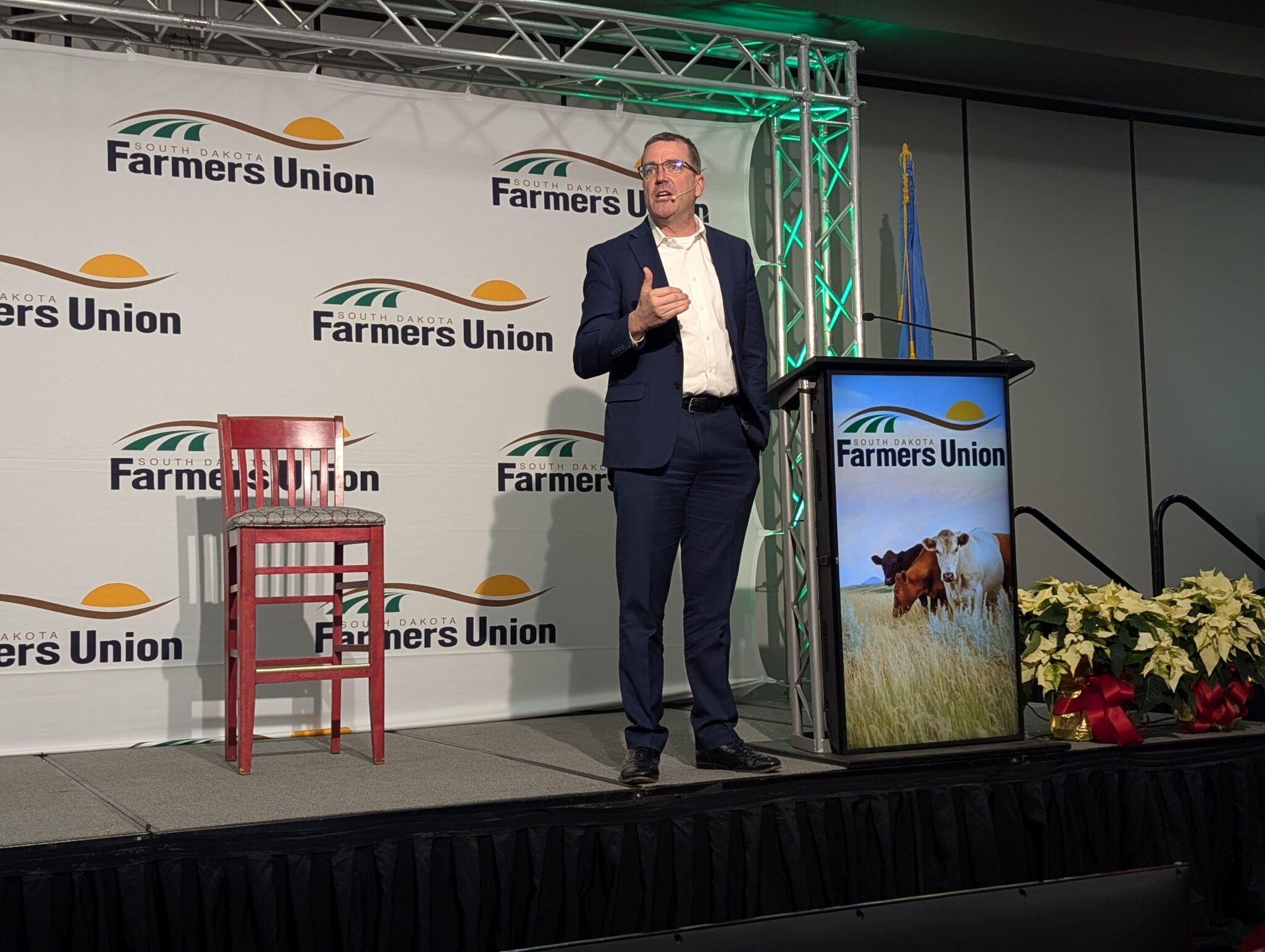
John Hult/South Dakota Searchlight
HURON – An agricultural economist told a group of farmers Thursday they’ll be well served to adapt to the cultural and policy changes that affect their industry – even the changes they don’t like.
Matthew Roberts is a former Ohio State University professor who’s now a research analyst with a company called Terrain who speaks to farm groups across the U.S. on global trends in the business.
Roberts told attendees of the South Dakota Farmers Union annual convention that plummeting global poverty over the past 40 years has meant better access to food for a wider swath of the world population.
Roberts flashed slides showing that the number of people worldwide living on the equivalent of $1.90 a day or less has dropped by two-thirds since 1980. That’s meant more people are able to afford healthier food, and more people around the world are eating meat.
“It is simple, fundamental human nature that the wealthier people are, the better they eat,” Roberts said.
Farmers play a huge role in addressing that demand, he said, by exporting the grain needed to feed livestock and humans. Since 2000, he said, China’s soybean imports have grown enough to require 73 million more acres from U.S. producers.
People in the U.S., China and a host of other countries that import agricultural goods from the U.S. are having fewer children, Roberts said, but he’s not concerned about a drop in demand for agricultural goods, because those children have more money and buy more expensive food.
That could mean changes in what’s grown or raised, but he expects demand to continue.
There again he pointed to China, which now consumes 90 million metric tons of meat each year. In 1990, that figure was 25 million metric tons.
Labor force worries
What does worry him is a smaller labor force. Fewer births mean fewer workers across every industry, and that will force every industry to adapt with technology, automation and outsourcing for certain positions.
“The labor force decline is not a temporary thing, and there’s not any good evidence that there’s anything a government can do that really changes it,” Roberts said.
For farmers, he said, dealing with that will force them to pay even closer attention to profits and losses and yields, but also to learn the soft skills necessary to manage employees and keep them happy enough to stick around. Complaining about younger generations being too soft or unwilling to work might feel good, he said, but won’t change younger workers’ expectations from their employers.
“Hard skills” like agronomy and accounting can be outsourced, but managing workers on site means learning kindness, positive intent and understanding.
“That’s soft, that’s squishy, but that’s the world we live in,” Roberts said. “Otherwise, you’re going to have to learn how to run your operations.”
He also encouraged attendees with family operations to lean on their children to handle the books and technology side of operations.
Embrace consumer demands, regulatory frameworks
Farmers might also scoff at changing consumer tastes. Some consumers in the U.S. want to know where their food comes from, and many are willing to pay a premium for that knowledge.
Roberts recalled picking up farm-to-table deliveries for a vacationing neighbor and noticing that they’d paid $12 for a dozen eggs. Some of the eggs still had manure on them.
The eggs in the carton were nutritionally identical to the eggs his neighbors could’ve purchased in the store, he said, but they wanted to know where the eggs had come from.
More importantly for Farmers Union members, he said, was the fact that the farmer who sold them kept all the money. A farmer who thinks consumers make silly choices can nonetheless benefit by serving those customers.
“How much of that $12 goes to the producer? Twelve dollars of it. Because I can guarantee you no processor is selling a poo-covered egg,” Roberts said.
He also urged farmers to adapt as quickly as possible to regulatory changes. Farmers in California who adjusted their operations decades ago to comply with that state’s farm management mandates are in better financial shape than those who thumbed their nose at them.
“Too many people say ‘I think that’s stupid, I’m not doing it,’ instead of ‘that’s stupid, but I’m going to comply better and sooner than everyone else and take advantage of it,’” Roberts said.
